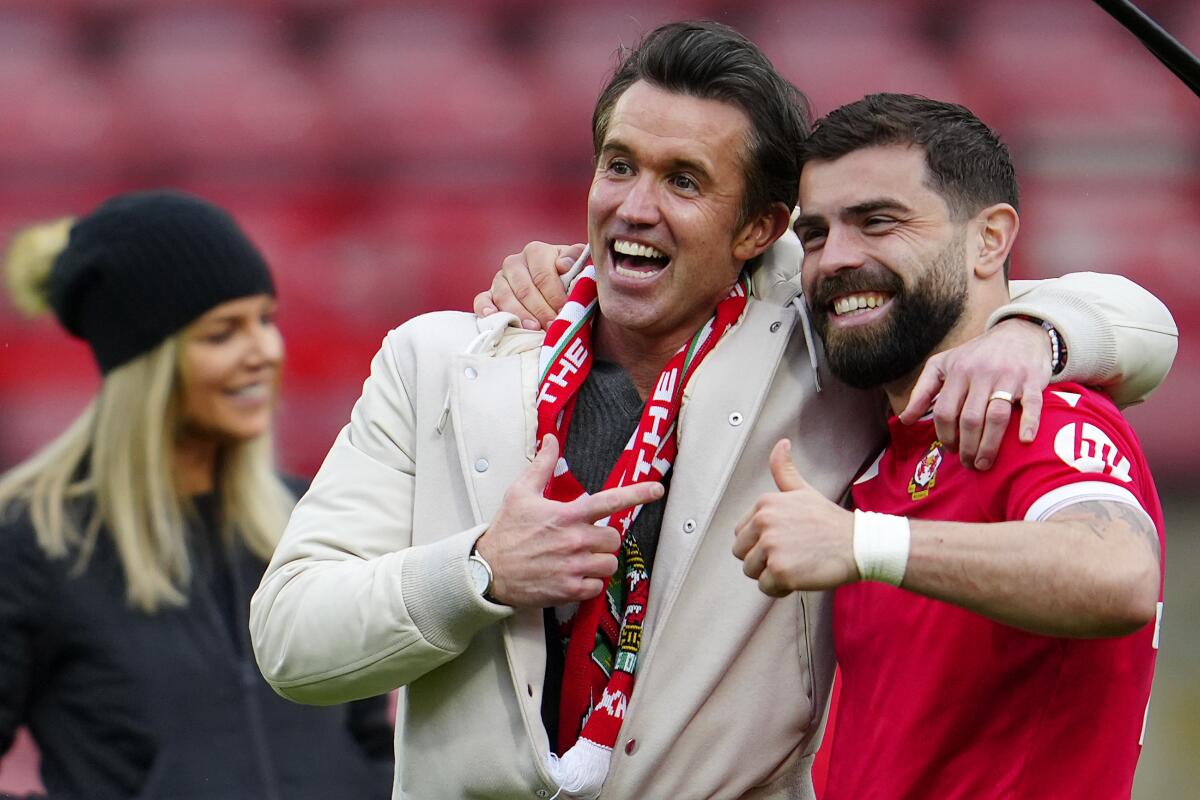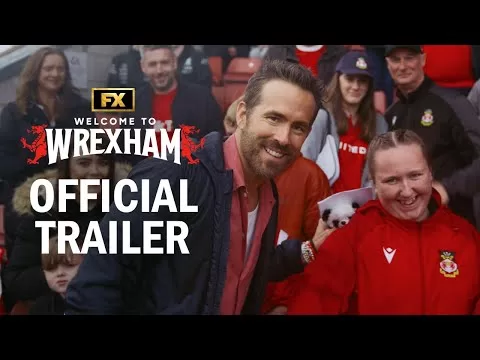Funding the team’s rise, and saving the down-on-its-luck Welsh city where the club plays, was the whole point of the series when actors Rob McElhenney (“It’s Always Sunny in Philadelphia”) and Ryan Reynolds (“Deadpool”) came up with the idea of buying Wrexham AFC during the pandemic.
So when the club, the third-oldest professional team in the world, was promoted last April — and, spoiler alert, was promoted again this month to the third-tier League One — shouldn’t that have been a wrap? Wasn’t that the time to roll credits?
Not necessarily. Because now the goal has changed.
“That’s the beauty of sport. You just don’t know where it’s going to end,” said McElhenney, a hardcore fan of Philadelphia’s professional sports teams. “Our ultimate goal is to build a sustainable model that will allow us to not only get to the Premier League, but sustain in the Premier League and eventually win the Premier League and be in the Champions League.”
To put that in perspective, in U.S. sports that would be like taking a rookie-league baseball team and turning it into the New York Yankees — if baseball had promotion and relegation, which it does not. So there really is no comparison.
But since McElhenney and Reynolds come from a world of make believe, where nothing is impossible, why not dream big? Well, for one thing this isn’t a Hollywood script in which the guy gets the girl and evil never wins. There’s no guarantee “Welcome to Wrexham” will have a happy ending.
But it wouldn’t be wise to bet against that.
“That’s part of the gambit here. You’re surrendering to fate,” Reynolds said. “You can’t write the script in advance. You can only work as hard as humanly possible to put the best club and infrastructure out on the onto that pitch and that’s what makes it compelling. That we don’t have that kind of control.
“And in football, not unlike life, anything can happen.”

Also in football, not unlike life, spending a lot of money can sure improve your odds. And McElhenney and Reynolds have spent a lot of money. It cost them more than $2.5 million to buy the team and another $4.7 million to buy back the freehold of the team’s historic stadium, according to published reports.
They spent on players too. Paul Mullin, the league’s leading scorer in Wrexham’s final two seasons in the fifth-tier National League, and teammate Ben Tozer each made more than $5,000 a week, about three times the league’s average wage. Two others reportedly made $3,700 a week.
That was steep in the National League, one that had been made up of small-town teams often owned by local businessmen who weren’t backed by Hollywood studios. But it’s perfectly legal, too, since the league does not have a salary cap or fair play protections.
“At the moment, there’s no level playing field,” Jim Parmenter, chairman of National League club Dover, told the Athletic last spring.
In the first episode of Season 2, McElhenney and Reynolds are told Wrexham lost $12 million in their first season despite leading the league in attendance. Yet they kept spending to buy promotion to League 2 later that same season, something for which they make no apologies.

Wrexham co-owner Rob McElhenney, left, celebrates with Wrexham’s Elliot Lee after a match against Stockport on Saturday.
(Jon Super / Associated Press)
“The rules and regulations around these leagues are really prescriptive,” Reynolds said. “You have a very clear set of boundaries and rules to work within. And I think every team is encouraged to to work as hard as you possibly can and do whatever you could possibly can within those margins.
“That’s exactly what we’ve been doing with Wrexham. You can loath me, you can loath Rob, but it’s pretty damn hard to root against this town and what they’ve been through for so many decades and what this club has meant to this town. So we will do anything humanly possible to see that Wrexham continues to progress and grow in the in the world football community.”
Besides, Wrexham isn’t the only club or community that has benefited. According to the the Athletic, 22 the 72 teams in the Championship, League One and League Two — at the second, third and fourth levels of English soccer — are either wholly owned by or have minority investors hailing from the U.S. with 14 of them experiencing new investment since the actors took control at Wrexham in February 2021.
Thanks to the focus of the docuseries, the profile of League 2 has never been higher. And that’s meant higher salaries, more interest and larger crowds, with three teams topping 10,800 a game heading into last weekend, about double the league average last season.
The TV show, Wrexham’s summer tour of the U.S. — a trip that will be repeated this July — plus sponsorship deals with United Airlines and others could push Wrexham’s turnover this season to more than $25 million, nearly four times what it was just two years ago. That’s a rising tide that will lift all the boats in League 2 — and, presumably, next season in League 1.
It’s already lifted Wrexham — the team and the town, which were struggling through some rough times when McElhenney and Reynolds took their gamble, riding to the rescue and lifting the hopes and self-confidence of both.
“You know, there’s just no sure things. It’s why they have the great expression giant killers in this sport,” Reynolds said. “I think the thing that I’m most surprised by in this whole experience, aside from how forthcoming and vulnerable the folks in Wrexham have been telling their story, is how romantic this game is.
“Prior to Wrexham most of my football exposure came from watching the Canadian national women’s team. I saw glimpses of it with those women fighting for their country and their sport. But boy have I seen it in Wrexham and in this sport in general.
“It’s just the most romantic thing in the world.”
Why would anyone want to see that end?
⚽ You have read the latest installment of On Soccer with Kevin Baxter. The weekly column takes you behind the scenes and shines a spotlight on unique stories. Listen to Baxter on this week’s episode of the “Corner of the Galaxy” podcast.
